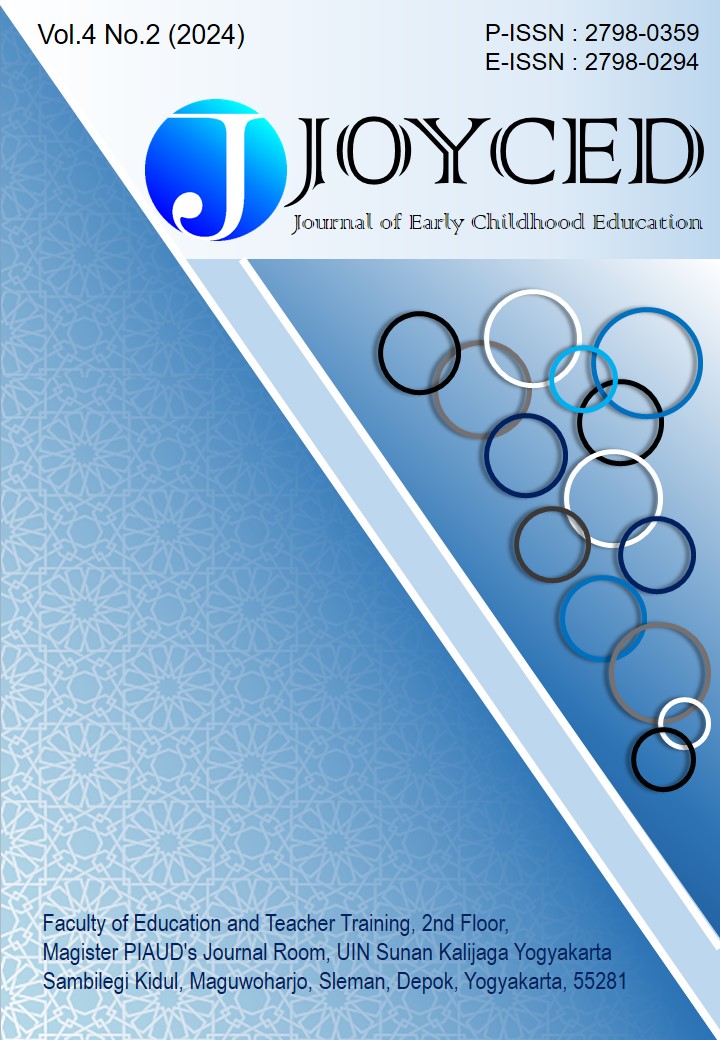Development of the Is-Me Board Game to Instill Religious Values and Love for Malay Culture in Children Aged 4-6 Years
DOI:
https://doi.org/10.14421/joyced.2024.42-02Keywords:
Malay Culture, Religious Values, Early Childhood, Board GameAbstract
Early childhood is referred to as the golden age, which is in the foundational phase. In this era, the prevalence of online games that children can play for long periods has many negative impacts on their development. Currently, there is a lack of educational play tools that encourage children to engage in activities, develop Islamic values, and foster a love for Malay culture. The purpose of this research is to develop the Is-Me board game with themes of Islam and Malay culture so that it can be used to instill religious values and a love for Malay culture in children aged 4-6 years. This study uses a Research and Development (R&D) approach with the 4D model (Define, Design, Develop, and Dissemination). The validity level from material experts reached 90%, while media experts reached 91%. The research results show that the Is-Me board game media developed using the 4D model can be considered feasible for use, as confirmed by the validity test involving material and media experts, and it has been trialed for the use of the media.
References
Amelia, S., Iswandi, H., Fakultas, ), Pemerintahan Dan Budaya, I., & Komunikasi Visual, D. (2023). Board Game Sebagai Media Literasi Digital Mengenai Pemajuan Kebudayaan di Kota Palembang. 8(1).
Arikunto, Suharsimi. (2016). Prosedur Penelitian Suatu Pendekatan Praktik. Rineka Cipta.
Begy, J. (2015). Board Games and the Construction of Cultural Memory. Games and Culture, 12(7–8), 718–738. https://doi.org/10.1177/1555412015600066
Collins, K. C., & Griess, C. J. (2012). It’s all in the game: designing and playing board games to foster communication and social skills.
Darwis, D. A. (2023). Melayu Di Tepi Jurang. Semut Api.
Eisenack, K. (2012). A Climate Change Board Game for Interdisciplinary Communication and Education. Simulation & Gaming, 44(2–3), 328–348. https://doi.org/10.1177/1046878112452639
Fernand Gobet, J. R. A. de V. (2004). Moves in Mind. The Psychology of Board Games. Psychology Press.
Hinebaugh, J. P. (2009). A board game education. R&L Education.
Hunsucker, A. J. (2016). Board Games as a Platform For Collaborative Learning. https://www.researchgate.net/publication/309385174
Mahyuddin, N., Yaswinda, Y., Sofya, R., & Putri, V. M. (2022). Innovation and Implementation of Boardgame Media to Develop Aspects of Early Childhood Development.
Piette, É., Stephenson, M., Soemers, D. J. N. J., & Browne, C. (2021). General Board Game Concepts. 2021 IEEE Conference on Games (CoG), 1–8. https://doi.org/10.1109/CoG52621.2021.9618990
Putri, I. A., & Anggapuspa, M. L. (2023). Perancangan Board Game Sebagai Media Pembelajaran Rukun Islam Untuk Anak Usia 9-12 Tahun. Jurnal Barik, 4(2), 227–241. https://ejournal.unesa.ac.id/index.php/JDKV/
Retnaningsih, L. E., & Rosa, N. N. (2022). Trik Jitu Menanamkan Pendidikan Karakter Pada Anak Usia Dini. Nawa Litera Publishing.
Ronkainen, M. (2016). Learning by playing: Developing a board game for preschool children.
Siregar, S. M., & Nadiroh, N. (2017). Peran Keluarga Dalam Menerapkan Nilai Budaya Suku Sasak Dalam Memelihara Lingkungan. Jurnal Green Growth Dan Manajemen Lingkungan, 5(2), 28–40. https://doi.org/10.21009/jgg.052.04
Soekmono, R., Armayuda, E., & Risina, D. F. (2021). Pengembangan Media Boardgame Multikultural AUD Ethnic Enclave Kota Lama melalui Desain Iteratif. Jurnal Obsesi : Jurnal Pendidikan Anak Usia Dini, 6(3), 1938–1954. https://doi.org/10.31004/obsesi.v6i3.1904
Soekmono, R., Risina, D. F., & Armayuda, E. (2023). Fostering Diversity Awareness of Early Childhood through Multicultural Board Game Ethnic Enclave Kota Lama, Semarang, Indonesia. Proceedings of the 4th International Conference on Law, Social Sciences, and Education, ICLSSE 2022, 28 October 2022, Singaraja, Bali, Indonesia.
Sugiyono. (2017). Metode Penelitian Kuantitatif, Kualitatif, dan R&D. CV. Alfabeta.
Daniela K. Oneill and Paige E. Holmes. (2022). The Power of Board Games for Multidomain Learning in Young Children •.
Zagal, J. P., Rick, J., & Hsi, I. (2006). Collaborative games: Lessons learned from board games. Simulation & Gaming, 37(1), 24–40. https://doi.org/10.1177/1046878105282279






.png)











